Unit 4 Information Technology Lesson 2 Apps课件(共30张,内嵌音频)北师大版(2019)必修第二册(共31页)
文档属性
| 名称 | Unit 4 Information Technology Lesson 2 Apps课件(共30张,内嵌音频)北师大版(2019)必修第二册(共31页) | 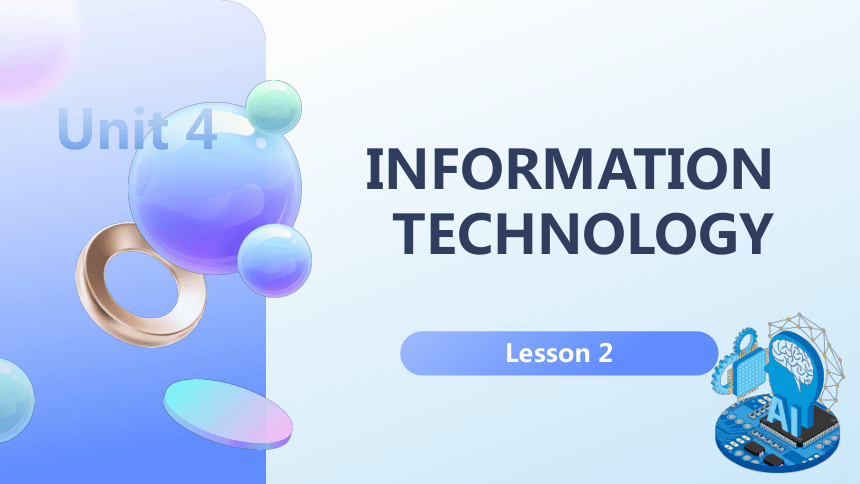 | |
| 格式 | pptx | ||
| 文件大小 | 27.8MB | ||
| 资源类型 | 教案 | ||
| 版本资源 | 北师大版(2019) | ||
| 科目 | 英语 | ||
| 更新时间 | 2025-08-01 11:07:47 | ||
图片预览

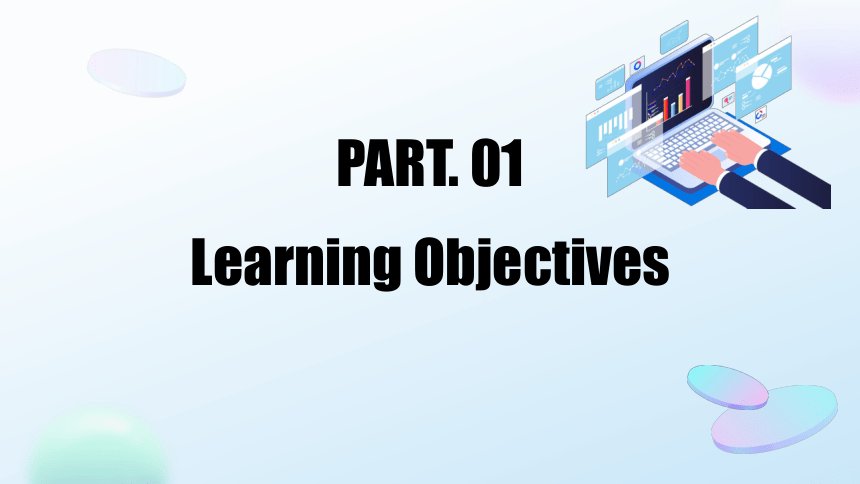
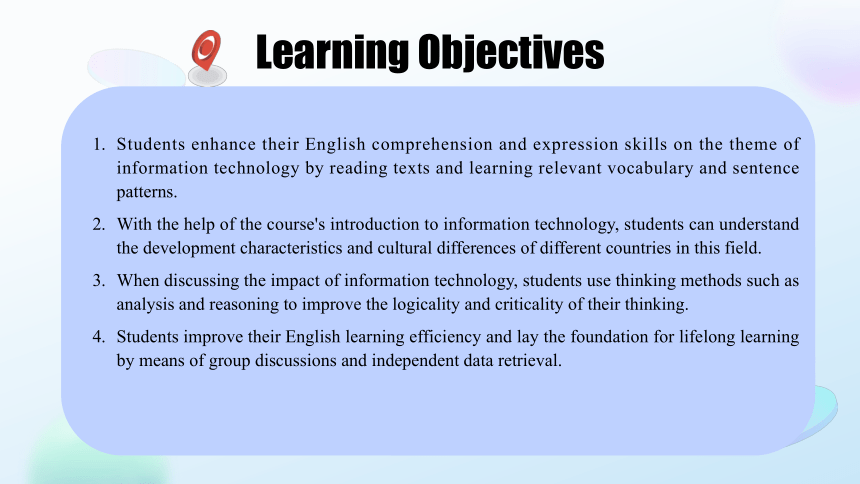
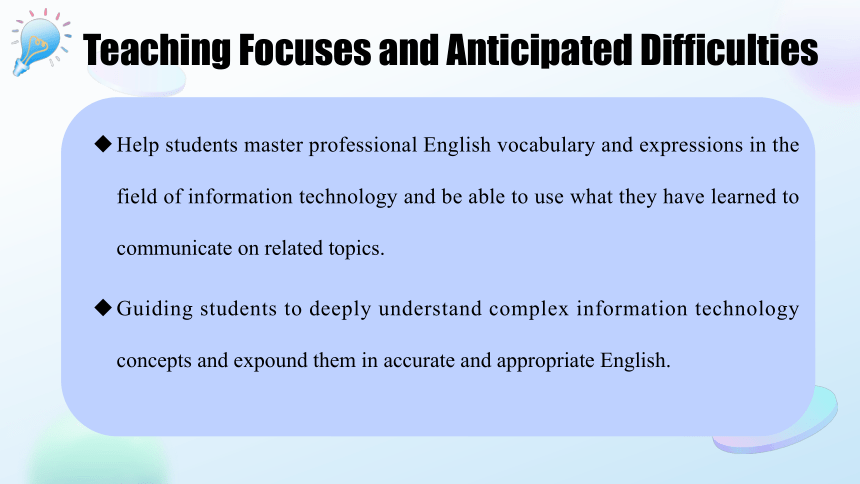

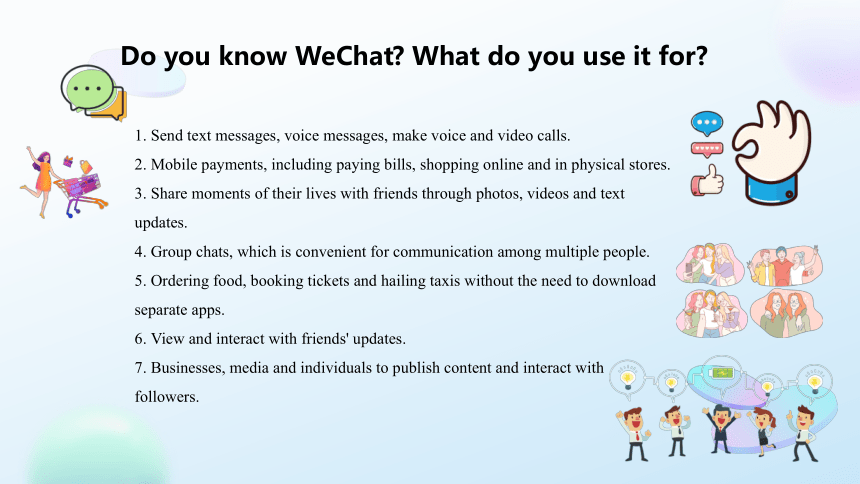
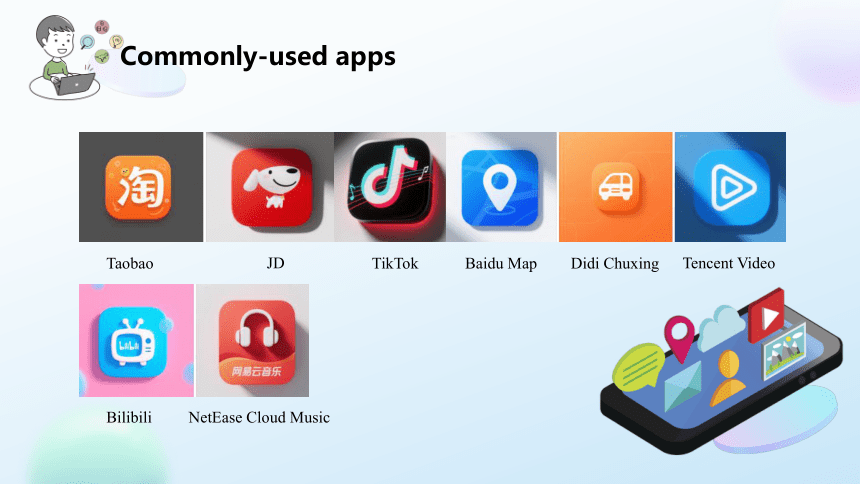

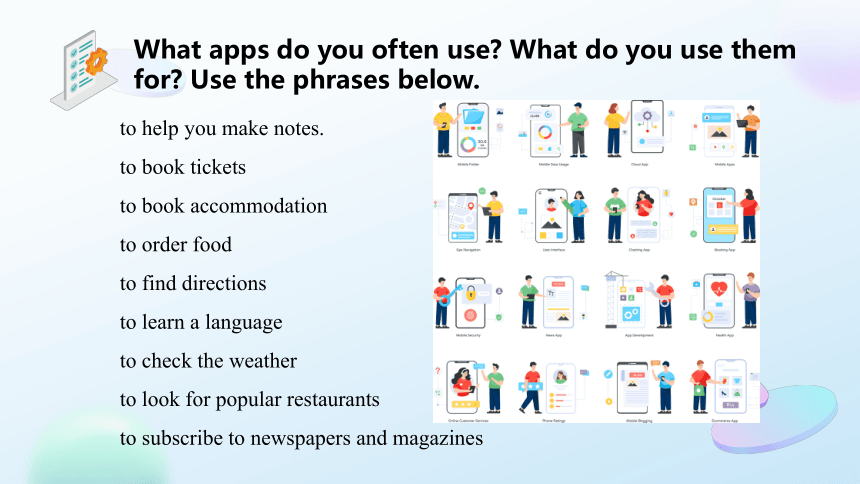
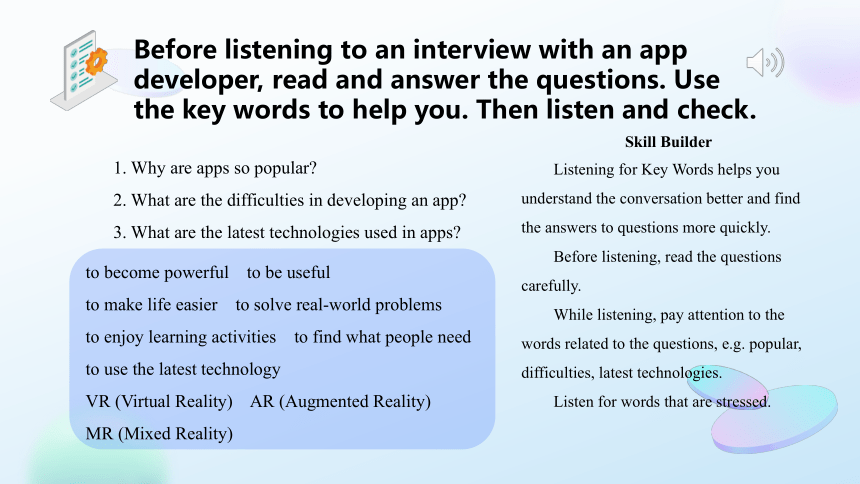
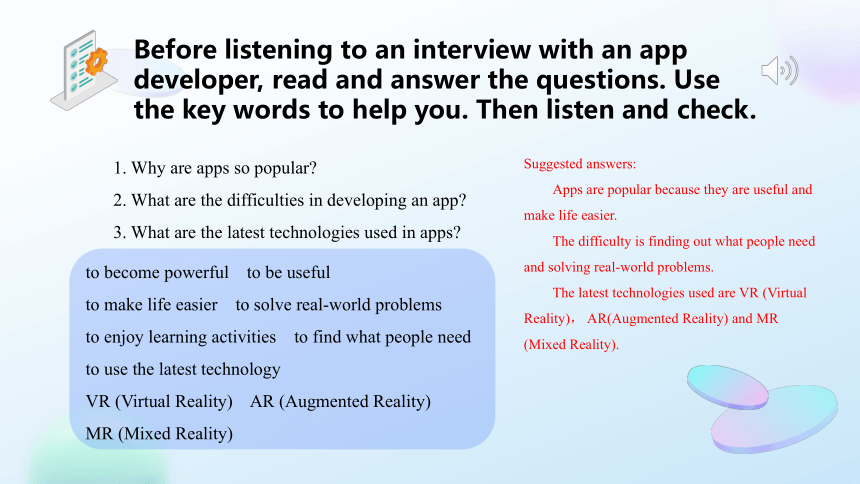
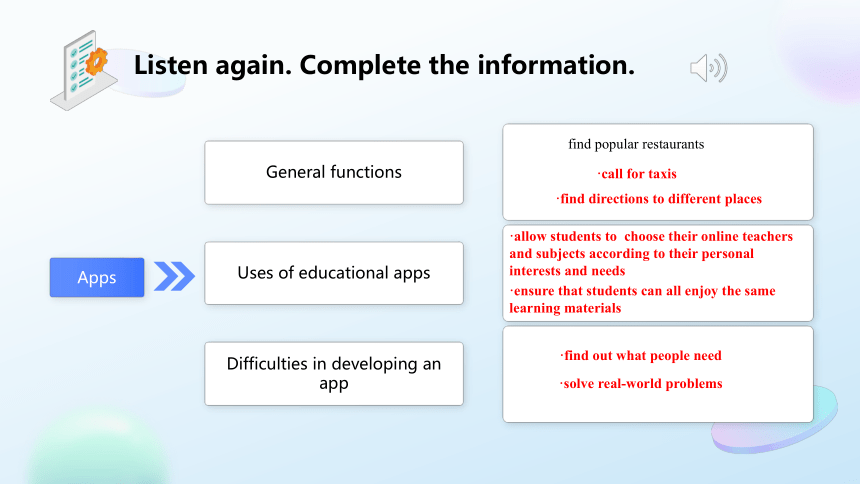
文档简介
(共30张PPT)
Unit 4
INFORMATION
TECHNOLOGY
Lesson 2
Learning Objectives
PART. 01
Learning Objectives
Students enhance their English comprehension and expression skills on the theme of information technology by reading texts and learning relevant vocabulary and sentence patterns.
With the help of the course's introduction to information technology, students can understand the development characteristics and cultural differences of different countries in this field.
When discussing the impact of information technology, students use thinking methods such as analysis and reasoning to improve the logicality and criticality of their thinking.
Students improve their English learning efficiency and lay the foundation for lifelong learning by means of group discussions and independent data retrieval.
Teaching Focuses and Anticipated Difficulties
Help students master professional English vocabulary and expressions in the field of information technology and be able to use what they have learned to communicate on related topics.
Guiding students to deeply understand complex information technology concepts and expound them in accurate and appropriate English.
Lead-in
PART. 02
Do you know WeChat What do you use it for
1. Send text messages, voice messages, make voice and video calls.
2. Mobile payments, including paying bills, shopping online and in physical stores.
3. Share moments of their lives with friends through photos, videos and text updates.
4. Group chats, which is convenient for communication among multiple people.
5. Ordering food, booking tickets and hailing taxis without the need to download separate apps.
6. View and interact with friends' updates.
7. Businesses, media and individuals to publish content and interact with followers.
Commonly-used apps
Taobao
JD
TikTok
Baidu Map
Didi Chuxing
Tencent Video
Bilibili
NetEase Cloud Music
Listening and Speaking
PART. 03
What apps do you often use What do you use them for Use the phrases below.
to help you make notes.
to book tickets
to book accommodation
to order food
to find directions
to learn a language
to check the weather
to look for popular restaurants
to subscribe to newspapers and magazines
Before listening to an interview with an app
developer, read and answer the questions. Use
the key words to help you. Then listen and check.
1. Why are apps so popular
2. What are the difficulties in developing an app
3. What are the latest technologies used in apps
to become powerful to be useful
to make life easier to solve real-world problems
to enjoy learning activities to find what people need to use the latest technology
VR (Virtual Reality) AR (Augmented Reality)
MR (Mixed Reality)
Skill Builder
Listening for Key Words helps you understand the conversation better and find the answers to questions more quickly.
Before listening, read the questions carefully.
While listening, pay attention to the words related to the questions, e.g. popular, difficulties, latest technologies.
Listen for words that are stressed.
Before listening to an interview with an app
developer, read and answer the questions. Use
the key words to help you. Then listen and check.
1. Why are apps so popular
2. What are the difficulties in developing an app
3. What are the latest technologies used in apps
to become powerful to be useful
to make life easier to solve real-world problems
to enjoy learning activities to find what people need to use the latest technology
VR (Virtual Reality) AR (Augmented Reality)
MR (Mixed Reality)
Suggested answers:
Apps are popular because they are useful and make life easier.
The difficulty is finding out what people need and solving real-world problems.
The latest technologies used are VR (Virtual Reality), AR(Augmented Reality) and MR (Mixed Reality).
Listen again. Complete the information.
Apps
General functions
Uses of educational apps
Difficulties in developing an app
find popular restaurants
·call for taxis
·find directions to different places
·allow students to choose their online teachers and subjects according to their personal interests and needs
·ensure that students can all enjoy the same learning materials
·find out what people need
·solve real-world problems
Group Work Answer the questions using the information in the previous question to help you.
1. What are some general functions of apps
2. What can students do with educational apps
3. According to Li Xing, what are the difficulties in developing an app
General functions include: finding popular restaurants, calling for taxis, finding directions to different places, and so on.
Students can choose their online teachers and subjects on educational apps according to their personal interests and needs.
The most difficult thing is finding out what people need and solving real-world problems.
Group Work Answer the questions using the information in the previous question to help you.
4. If you are able to develop an app to solve a real-world problem, what problem
would you like to solve And how
If I could develop an app to solve a real issue, I’d focus on caring for elderly people living alone. It would connect to smart devices for safety alerts if no activity or health issues arise. Seniors could use voice or a simple interface to request help , with nearby volunteers responding. It also includes emotional interaction features and health reminders, building a community support network for independent yet supported living.
Listen to two conversations. What help does Dad ask for in the first conversation What help does Barbara Smith ask for in the second conversation
Suggestion:
Dad asks for help in setting up an account on a shopping app.
Barbara Smith asks for help in finding out why the goods she ordered haven't arrived.
Listen and plete the Talk Builder.
Asking for help
1. ____________________ with something
2. ____________________ set up an account.
3. I haven't received the goods.
____________________ and find out
what's going on
4. ____________________ check again
Offering help
1. ____________________ downloading it
2. No worries. ____________________ with that.
3. ____________________ help you
4. ____________________ enquire about the
order with the delivery man.
5. ____________________ anything else today
Can you help me out
I can't figure out how to
Can you do me a favour
Would you be able to
Do you need help
I can help you
How may I
Let me
Can I assist you with
The differences between formal and informal language usage.
正式场合 非正式场合 例子
词汇选择 精确、规范且书面化 口语化、随意 commence
start
语法结构 复杂、严谨 省略、缩写 The project, which was initiated last year is expected to be completed.
I’m gonna go to the store. Want anything
表达方式 注重礼貌和尊重 直接、坦率 Would you mind if I...
Just do it.
语气和态度 严谨、客观 有个人情感色彩 The committee hereby confirms that all procedures have been executed in accordance with statutory regulations, and no violations have been identified.
Hey, guess what I aced the math test! Wanna grab a milkshake to celebrate later
社交礼仪表达 规范、标准 随意、简单 May I have the pleasure of your company
Hey, let's eat together.
Look at the Talk Builder. Pick out the expressions that are formal / informal and explain why.
formal: 4
informal: 1; 2; 3
formal: 1; 3; 4; 5
informal: 2
Pair Work. Role-play the following situations. Note the formal / informal use of language.
Student A: a mother who wants to choose an app
Student B: the son / daughter offering to help
Student A: a teenager preparing for a party
Student B: a friend offering to help to buy things online for Student A
When talking with family members, the conversation is informal, while when talking with people you don't know or don't understand, the conversation is formal.
Vocabulary
1.accommodation
accommodate v.为······提供住处;容纳;提供空间;适应
例题:
It’s difficult to find affordable _____________ in the city center.
accommodation
make/offer accommodation for 为······提供住所
arrange sb’s accommodation 为某人安排住处
accommodate sb with sth 用某物帮某人
accommodate sb for the night 留某人过夜
accommodate to 适应······
accommodate...to... 使······适应······
accommodate oneself to 使某人适应
Vocabulary
2.reality
real adj. 真实的;实际存在的;真正的
realistic adj. 现实的;实事求是的;逼真的
really adv. 真正地;确实;实际上
realize v. 意识到;认识到;实现
realization n. 认识;领悟;实现
例题:
____________, success requires not just talent but also consistent effort and patience.
In reality
escape reality 逃避现实
in reality 实际上;事实上
Vocabulary
3.material
materialize v. 突然出现;成为现实;具体化
materialism n. 唯物主义;物质主义
materialist n. 唯物主义者;物质主义者
materialistic adj. 物质主义的;追求物质财富的
例题:
The factory imports raw ___________ from overseas to produce high-quality furniture.
materials
Exercise
PART. 04
Exercise: Word spelling.
1. The firefighters made a brave a _______ to save the people trapped in the burning building.
2. The old bridge was badly d__________ in the earthquake and needed to be repaired immediately.
3. When I was talking, he suddenly i__________ me and asked an irrelevant question.
4. The l__________ of his pet dog made him very sad and he couldn't stop crying.
5. We should always be careful when driving to avoid being t__________ in a traffic jam.
ttempt
amaged
nterrupted
oss
rapped
Exercise: Fill in the blanks with the appropriate forms of the given words.
1. The government plans to take effective ___________ (measure) to reduce air pollution.
2. The ___________ (operate) of the new machine will be demonstrated by the technician.
3. Many students dream of studying ___________ (overseas) in the future.
4. The construction ___________ (site) of the new stadium is being prepared now.
5. The ___________ (process) of making chocolate involves several complex steps.
6. The soldiers showed great courage in the fierce ___________ (battle).
measures
operation
overseas
site
process
battle
Summary
PART. 05
添加标题
ADD THE TITLE HERE
Lesson 2
Vocabulary
Factual information about apps, such as their purposes and functions.
Choose appropriate language forms according to different scenarios and communication objects to seek and provide help.
Listening
accommodation, reality, material
Homework
PART. 06
Homework
Set a scenario with friends or family members and have a conversation, making sure to use appropriate language forms.
See you next class!
Unit 4
INFORMATION
TECHNOLOGY
Lesson 2
Learning Objectives
PART. 01
Learning Objectives
Students enhance their English comprehension and expression skills on the theme of information technology by reading texts and learning relevant vocabulary and sentence patterns.
With the help of the course's introduction to information technology, students can understand the development characteristics and cultural differences of different countries in this field.
When discussing the impact of information technology, students use thinking methods such as analysis and reasoning to improve the logicality and criticality of their thinking.
Students improve their English learning efficiency and lay the foundation for lifelong learning by means of group discussions and independent data retrieval.
Teaching Focuses and Anticipated Difficulties
Help students master professional English vocabulary and expressions in the field of information technology and be able to use what they have learned to communicate on related topics.
Guiding students to deeply understand complex information technology concepts and expound them in accurate and appropriate English.
Lead-in
PART. 02
Do you know WeChat What do you use it for
1. Send text messages, voice messages, make voice and video calls.
2. Mobile payments, including paying bills, shopping online and in physical stores.
3. Share moments of their lives with friends through photos, videos and text updates.
4. Group chats, which is convenient for communication among multiple people.
5. Ordering food, booking tickets and hailing taxis without the need to download separate apps.
6. View and interact with friends' updates.
7. Businesses, media and individuals to publish content and interact with followers.
Commonly-used apps
Taobao
JD
TikTok
Baidu Map
Didi Chuxing
Tencent Video
Bilibili
NetEase Cloud Music
Listening and Speaking
PART. 03
What apps do you often use What do you use them for Use the phrases below.
to help you make notes.
to book tickets
to book accommodation
to order food
to find directions
to learn a language
to check the weather
to look for popular restaurants
to subscribe to newspapers and magazines
Before listening to an interview with an app
developer, read and answer the questions. Use
the key words to help you. Then listen and check.
1. Why are apps so popular
2. What are the difficulties in developing an app
3. What are the latest technologies used in apps
to become powerful to be useful
to make life easier to solve real-world problems
to enjoy learning activities to find what people need to use the latest technology
VR (Virtual Reality) AR (Augmented Reality)
MR (Mixed Reality)
Skill Builder
Listening for Key Words helps you understand the conversation better and find the answers to questions more quickly.
Before listening, read the questions carefully.
While listening, pay attention to the words related to the questions, e.g. popular, difficulties, latest technologies.
Listen for words that are stressed.
Before listening to an interview with an app
developer, read and answer the questions. Use
the key words to help you. Then listen and check.
1. Why are apps so popular
2. What are the difficulties in developing an app
3. What are the latest technologies used in apps
to become powerful to be useful
to make life easier to solve real-world problems
to enjoy learning activities to find what people need to use the latest technology
VR (Virtual Reality) AR (Augmented Reality)
MR (Mixed Reality)
Suggested answers:
Apps are popular because they are useful and make life easier.
The difficulty is finding out what people need and solving real-world problems.
The latest technologies used are VR (Virtual Reality), AR(Augmented Reality) and MR (Mixed Reality).
Listen again. Complete the information.
Apps
General functions
Uses of educational apps
Difficulties in developing an app
find popular restaurants
·call for taxis
·find directions to different places
·allow students to choose their online teachers and subjects according to their personal interests and needs
·ensure that students can all enjoy the same learning materials
·find out what people need
·solve real-world problems
Group Work Answer the questions using the information in the previous question to help you.
1. What are some general functions of apps
2. What can students do with educational apps
3. According to Li Xing, what are the difficulties in developing an app
General functions include: finding popular restaurants, calling for taxis, finding directions to different places, and so on.
Students can choose their online teachers and subjects on educational apps according to their personal interests and needs.
The most difficult thing is finding out what people need and solving real-world problems.
Group Work Answer the questions using the information in the previous question to help you.
4. If you are able to develop an app to solve a real-world problem, what problem
would you like to solve And how
If I could develop an app to solve a real issue, I’d focus on caring for elderly people living alone. It would connect to smart devices for safety alerts if no activity or health issues arise. Seniors could use voice or a simple interface to request help , with nearby volunteers responding. It also includes emotional interaction features and health reminders, building a community support network for independent yet supported living.
Listen to two conversations. What help does Dad ask for in the first conversation What help does Barbara Smith ask for in the second conversation
Suggestion:
Dad asks for help in setting up an account on a shopping app.
Barbara Smith asks for help in finding out why the goods she ordered haven't arrived.
Listen and plete the Talk Builder.
Asking for help
1. ____________________ with something
2. ____________________ set up an account.
3. I haven't received the goods.
____________________ and find out
what's going on
4. ____________________ check again
Offering help
1. ____________________ downloading it
2. No worries. ____________________ with that.
3. ____________________ help you
4. ____________________ enquire about the
order with the delivery man.
5. ____________________ anything else today
Can you help me out
I can't figure out how to
Can you do me a favour
Would you be able to
Do you need help
I can help you
How may I
Let me
Can I assist you with
The differences between formal and informal language usage.
正式场合 非正式场合 例子
词汇选择 精确、规范且书面化 口语化、随意 commence
start
语法结构 复杂、严谨 省略、缩写 The project, which was initiated last year is expected to be completed.
I’m gonna go to the store. Want anything
表达方式 注重礼貌和尊重 直接、坦率 Would you mind if I...
Just do it.
语气和态度 严谨、客观 有个人情感色彩 The committee hereby confirms that all procedures have been executed in accordance with statutory regulations, and no violations have been identified.
Hey, guess what I aced the math test! Wanna grab a milkshake to celebrate later
社交礼仪表达 规范、标准 随意、简单 May I have the pleasure of your company
Hey, let's eat together.
Look at the Talk Builder. Pick out the expressions that are formal / informal and explain why.
formal: 4
informal: 1; 2; 3
formal: 1; 3; 4; 5
informal: 2
Pair Work. Role-play the following situations. Note the formal / informal use of language.
Student A: a mother who wants to choose an app
Student B: the son / daughter offering to help
Student A: a teenager preparing for a party
Student B: a friend offering to help to buy things online for Student A
When talking with family members, the conversation is informal, while when talking with people you don't know or don't understand, the conversation is formal.
Vocabulary
1.accommodation
accommodate v.为······提供住处;容纳;提供空间;适应
例题:
It’s difficult to find affordable _____________ in the city center.
accommodation
make/offer accommodation for 为······提供住所
arrange sb’s accommodation 为某人安排住处
accommodate sb with sth 用某物帮某人
accommodate sb for the night 留某人过夜
accommodate to 适应······
accommodate...to... 使······适应······
accommodate oneself to 使某人适应
Vocabulary
2.reality
real adj. 真实的;实际存在的;真正的
realistic adj. 现实的;实事求是的;逼真的
really adv. 真正地;确实;实际上
realize v. 意识到;认识到;实现
realization n. 认识;领悟;实现
例题:
____________, success requires not just talent but also consistent effort and patience.
In reality
escape reality 逃避现实
in reality 实际上;事实上
Vocabulary
3.material
materialize v. 突然出现;成为现实;具体化
materialism n. 唯物主义;物质主义
materialist n. 唯物主义者;物质主义者
materialistic adj. 物质主义的;追求物质财富的
例题:
The factory imports raw ___________ from overseas to produce high-quality furniture.
materials
Exercise
PART. 04
Exercise: Word spelling.
1. The firefighters made a brave a _______ to save the people trapped in the burning building.
2. The old bridge was badly d__________ in the earthquake and needed to be repaired immediately.
3. When I was talking, he suddenly i__________ me and asked an irrelevant question.
4. The l__________ of his pet dog made him very sad and he couldn't stop crying.
5. We should always be careful when driving to avoid being t__________ in a traffic jam.
ttempt
amaged
nterrupted
oss
rapped
Exercise: Fill in the blanks with the appropriate forms of the given words.
1. The government plans to take effective ___________ (measure) to reduce air pollution.
2. The ___________ (operate) of the new machine will be demonstrated by the technician.
3. Many students dream of studying ___________ (overseas) in the future.
4. The construction ___________ (site) of the new stadium is being prepared now.
5. The ___________ (process) of making chocolate involves several complex steps.
6. The soldiers showed great courage in the fierce ___________ (battle).
measures
operation
overseas
site
process
battle
Summary
PART. 05
添加标题
ADD THE TITLE HERE
Lesson 2
Vocabulary
Factual information about apps, such as their purposes and functions.
Choose appropriate language forms according to different scenarios and communication objects to seek and provide help.
Listening
accommodation, reality, material
Homework
PART. 06
Homework
Set a scenario with friends or family members and have a conversation, making sure to use appropriate language forms.
See you next class!
同课章节目录
- Unit 4 Information technology
- Lesson 1 Avatars
- Lesson 2 Apps
- Lesson 3 Internet and Friendships
- Unit 5 Humans and nature
- Lesson 1 A Sea Story
- Lesson 2 Professional Rescue Team
- Lesson 3 Race to the Pole
- Unit 6 The admirable
- Lesson 1 A Medical Pioneer
- Lesson 2 History Makers
- Lesson 3 The Superhero Behind Superman
